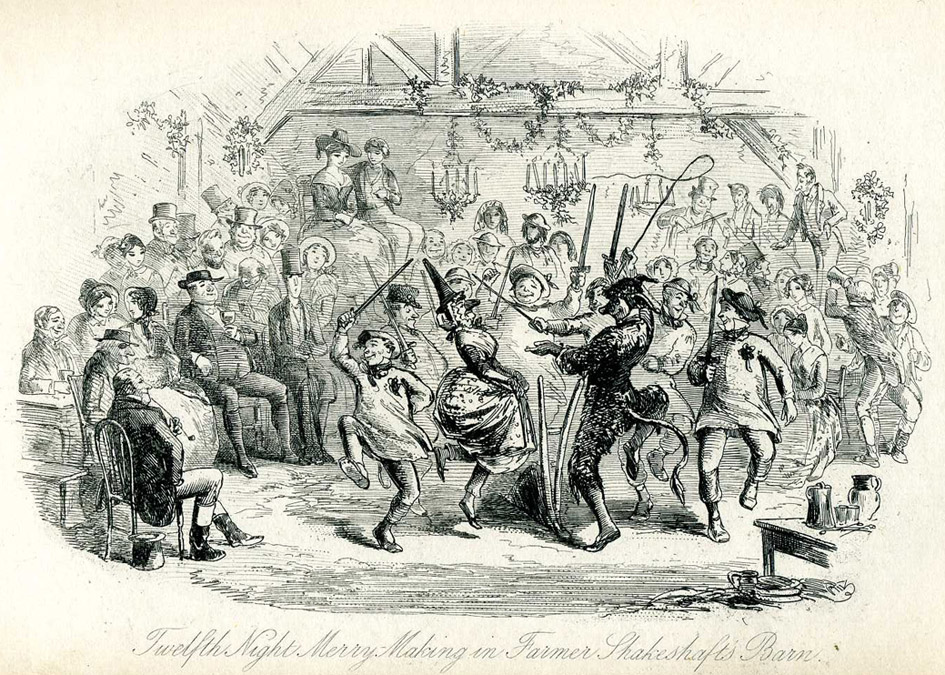* * * *

* * * *
I last posted on December 17, 2023. It’s now January 6, 2024.
Since that month-ago post I’ve gone through two family Christmases. One involved driving a thousand miles up to Massachusetts and back. The second came a week after the real Christmas, and both involved lots of pre-celebration preparation. (To get just the right gifts.) Then too, that first one involved catching some kind of nasty bug up in Wilkes-Barre PA, on the drive home. Which got me a “sore throat of Biblical proportions,” and had a dramatic impact on the second celebration as well. Which also means I’ve been going through lots of recuperation time, a recuperation helped in large part by generic NyQuil, DayQuil, and lots of new-discovered Vicks VapoCOOL Severe cough drops. (And by the way, “Those things work great!“)
But now it’s time to get back on track, with “Happy Epiphany, 2024!” And by the way, the Feast of Epiphany – celebrated each January 6 – officially ends the “12 days of Christmas:”
The Twelve Days of Christmas is the festive Christian season beginning on Christmas Day … that celebrates the birth of Jesus Christ, as the Son of God. This period is also known as Christmastide… The Feast of the Epiphany is on 6 January [and] celebrates the visit of the Wise Men (Magi) and their bringing of gifts to the child Jesus. In some traditions, the feast of Epiphany and Twelfth Day [or “Twelfth Night”] overlap.
Another tidbit: Aside from being called The Epiphany, it and the days close to it – and sometimes those days overlap – also include Plough Monday, Three Kings Day (as in, “We Three Kings of Orient are”), and – as noted above – Twelfth Night. And speaking of “12th Night,” the custom of eating and especially drinking way too much became such a problem that it was banned in some places. For example, “Twelfth Night in the Netherlands became so secularised, rowdy and boisterous that public celebrations were banned from the church.”
There’s more information – on “Three Kings of Orient” and other holidays in the 12 days of Christmas – in the links in the notes below. But getting back to Epiphany, the Epiphany is the “Christian feast day that celebrates the revelation of God the Son as human in Jesus Christ:”
The observance [of Epiphany] was a general celebration of the manifestation of the Incarnation of Jesus Christ. It included the commemoration of his birth; the visit of the Magi [and] all of Jesus’ childhood events, up to and including his baptism in the Jordan by John the Baptist…
One of those “childhood events” in the life of Jesus was His having to undergo circumcision. (A subject “good Christians” don’t like to talk about much.) That event is celebrated each January 1, as the eighth day after Jesus was born. (Assuming that happened on Christmas Eve.)
On January 1st, we celebrate the Circumcision of Christ. Since we are more squeamish than our ancestors, modern calendars often list it as the feast of the Holy Name of Jesus, but the other emphasis is the older. Every Jewish boy was circumcised (and formally named) on the eighth day of his life, and so, one week after Christmas, we celebrate the occasion when Our Lord first shed His blood for us. It is a fit close for a week of martyrs, and reminds us that to suffer for Christ is to suffer with Him. (E.A.)
See also Luke 2:21: “On the eighth day, when it was time to circumcise the child, he was named Jesus, the name the angel had given him before he was conceived.” That in turn was in accordance with Genesis 17:12: “For the generations to come every male among you who is eight days old must be circumcised.” And by the way, squeamish is defined as “easily shocked, offended, or disgusted by unpleasant things.” But unfortunately, such Unpleasant Things are a big part of life these days, and so something a Good Christian needs to get used to.
One other thing: January 6 also marks the start of the Season of Epiphany. That church season runs from the day of Epiphany to Ash Wednesday. In 2024 that comes on the same day as Valentine’s Day. (How’s that for irony?) And Ash Wednesday marks the beginning of Lent.
Put another way, Epiphanytide runs from January 6 to the Tuesday just before Ash Wednesday, which we know as Mardi Gras. All of which means Easter will come early this year, on March 31. And as if all that wasn’t enough, 2024 is also a Leap Year, meaning we get an extra day, on Thursday, February 29. And finally, there’s an election coming up in November, which “may determine the future of the Free World.” Here’s hoping for a happy and prosperous 2024…
* * * *

* * * *
The upper image is courtesy of Twelfth Night (holiday) – Wikipedia. The full caption: “‘Twelfth Night Merry-Making in Farmer Shakeshaft’s Barn,’ from Ainsworth‘s ‘Mervyn Clitheroe,’ by Phiz.”
The Book of Common Prayer reference. The “corporate-mystical” prayer is on page 339, the post-communion prayer for Holy Eucharist, Rite I.
For this post I borrowed from 2016’s Epiphany, circumcision, and “3 wise guys,” 2017’s To Epiphany – “and BEYOND,” Happy Epiphany – 2018, and On the Epiphany SEASON – 2022. Also from On the 12 DAYS of Christmas – 2021-22, and – on a sadder note – Epiphany ’23, the end of Christmas and “farewell Mi Dulce.”
Re: 2024. See 2024 is a leap year. Here’s what to know and when Easter, other holidays are next year.
The lower image is courtesy of Mardi Gras – Wikipedia. Captioned: “Mardi Gras Day, New Orleans: Krewe of Kosmic Debris revelers on Frenchmen Street.”
* * * *